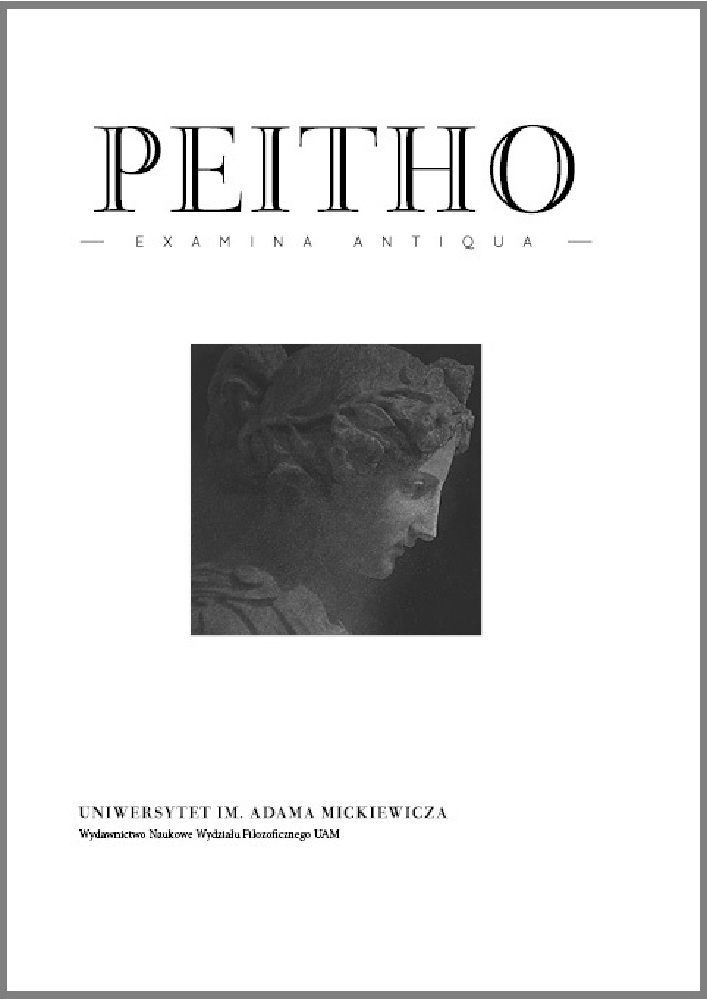Abstract
We suggest a certain minimal approach to the historical Socrates on the basis of Plato’s Apology. This text makes it possible to reconstruct the authentic charge and the defense line of Socrates, as well as his motivation and the quintessence of his philosophical challenge. The most important thing is what the philosopher says in the face of his death sentence: that the greatest good for a man is to live an examined life focusing on virtues and ethical values. Unfortunately, the preponderance of studies, even the most recent ones, fail to recognize the philosopher’s provocative challenge, whilst it is not only a crucial motif in the Socratic examining (ἐξετάζειν), i.e. testing the interlocutors’ knowledge by means of irony, elenchos and aporia, but also an inspiration for his direct and indirect followers in seeking virtues and the greatest good.References
Ahbel-Rappe S., Kamtekar R., 2009, (ed.), A Companion to Socrates, Blackwell.
Beys, K., 2001, The Trial of Socrates, Athens (także po grecku, niemiecku, francusku i japońsku).
Brickhouse, T., Smith, N., 2004, Plato and the Trial of Socrates. London.
Brisson, L., 1997, Platon, Apologie de Socrate. Criton, Paris.
Centrone, B., Taglia, A., 2010, Platone, Eutifrone, Apologia di Socrate, Critone, Torino.
Cooper, J. M., 2007, Socrates and Philosophy as a way of life, w: D. Scott (ed.), Maieusis: essays in ancient philosophy in honour of Myles Burnyeat, ss. 20–44, Oxford.
Dorion, L.-A., 2004, Socrate, Paris (także po grecku i włosku).
Döring, K., 1998, Sokrates, die Sokratiker und die von ihnen begründeten Traditionen, w: Flashar, K. (hrsg.), Grundriss der Geschichte der Philosophie, Basel, ss. 141–364.
Erler, M., 2007, Platon, w: Flashar K. (hrsg.), Grundriss der Geschichte der Philosophie, Basel.
Figal, G., 1995, Sokrates, München (po włosku: Bologna 2001).
Giannantoni, G., 1990, Socratis et Socraticorum Reliquiae, vol. I–IV, Napoli.
Giannantoni, G., 1993, Socrate, Roma.
Giannantoni, G., 2005, Dialogo socratico e nascita della dialettica nella filosofia di Platone, B. Centrone (cur.),Napoli.
Hadot, P., 2000, Czym jest filozofia starożytna?, przełożył P. Domański, Warszawa.
Horn, Ch., 1998, Antike Lebenskunst. Glück und Moral von Sokrates bis zu den Neuplatonikern, München (także po włosku).
Kahn, Ch., 1996, Plato and the Socratic dialogue, Cambridge (także po włosku).
Kraut, R., 2009, The Examined Life, w: Ahbel-Rappe S., Kamtekar R., 2009, ss. 228-242.
Legutko, R., 2003, Platon, Obrona Sokratesa, tłumaczenie i komentarz, Kraków.
Morrison, D., 2000, On the Alleged Historical Reliability of Platos’s ‘Apology’, AGPh 82, ss. 235–265.
Morrison, D., 2011, (ed.), The Cambridge Companion to Socrates, Cambridge.
Reale, G., 2000, Socrate. Alla scoperta della sapienza umana, Milano.
Reeve, C. D. C., 1989, Socrates in the Apology, Indianapolis.
Rossetti, L., 2011, Le dialogue socratique, Paris.
Taylor, C. C. W., 2000, Socrates. A Very Short Introduction, Oxford.
Vlastos, G., 1991, Socrates. Ironist and Moral Philosopher, Cambridge (także po grecku, francusku i włosku).
Vander Waerdt, P. A.,1994, The Socratic Movement, Ithaca–London.
Waterfield, R., 2009, Why Socrates Died: Dispelling the Myths, New York.
Wesoły, M., 2008, ‘System analityczny’ Platona w relacji krytycznej Arystotelesa, Roczniki Filozoficzne 56, ss. 299–320.
Wesoły, M., 2009, Platona „Gorgiasz” – kompozycja, zarzewie agonu i sokratejska wymowa w: A. Pacewicz (red.), Kolokwia Platońskie: Gorgiasz, Wrocław, ss. 15–29.
Wesoły, M., 2011, Plato’s ‘Gorgias’ as a Dramatic Requiem upon the Vindication of Socrates’ Life and Death, Diotima 39, ss. 99–110.
License
Peitho provides immediate open access to its content on the principle that making research freely available to the public supports a greater global exchange of knowledge.
